Product Overview
The EX4100 line of Ethernet access switches offers secure, cloud-ready access for enterprise campus, branch, and data center networks in the AI era and optimized for the cloud. These platforms boost network performance and visibility, meeting the security demands of today—as well as for networks of the next decade.
As part of the underlying infrastructure for Juniper Mist Wired Assurance, the EX4100 line is purpose-built for, and managed by, the cloud. The switches leverage Mist AI to simplify operations and provide better visibility into the experience of connected devices, delivering a refreshing, experience-first approach to access layer switching.
Product Description
The Juniper Networks® EX4100 line of Ethernet Switches offers a secure, cloud-ready portfolio of access switches ideal for enterprise branch, campus, and data center networks. The EX4100 switches combine the simplicity of the cloud, the power of Mist AI™, and a robust hardware foundation with best-in-class security and performance to deliver a differentiated approach to access switching in the cloud, mobile, and IoT era. With Juniper® Mist™ Wired Assurance, the EX4100 line of Switches can be effortlessly onboarded, configured, and managed from the cloud. This simplifies operations, improves visibility, and ensures a much better experience for connected devices.
Cloud Management with Juniper Mist Wired Assurance Driven by Mist AI
EX4100 switches can be quickly and easily onboarded (Day 0), provisioned (Day 1), and managed (Day 2+) from the cloud with Juniper Mist Wired Assurance, which brings AI-powered automation and insights that optimize experiences for end users and connected devices. The EX4100 provides rich Junos® operating system telemetry data for Mist AI, which helps achieve simpler operations, shorter mean time to repair (MTTR), and streamlined troubleshooting.
EVPN-VXLAN Technology
Most traditional campus networks have a single-vendor, chassis-based architecture that worked well for smaller, static campuses with few endpoints. However, this approach is too rigid to support the changing needs of modern campus networks. The EX4100 supports EVPN-VXLAN, extending an end-to-end fabric from campus core to distribution to the access layer.
An EVPN-VXLAN fabric is a simple, programmable, highly scalable architecture built on open standards. This technology can be applied in both data centers and campuses for architectural consistency. A campus EVPN-VXLAN architecture uses a Layer 3 IP-based underlay network and an EVPN-VXLAN overlay network. A flexible overlay network based on a VXLAN overlay with an EVPN control plane efficiently provides Layer 2 and/or Layer 3 connectivity throughout the network. EVPN-VXLAN also offers a scalable way to build and interconnect multiple campus sites, delivering:
irtual Chassis Technology
Juniper’s Virtual Chassis technology allows multiple interconnected switches to operate as a single, logical unit, enabling users to manage all platforms as one virtual device. Up to 10 EX4100 switches can be interconnected as a Virtual Chassis using 4 x 25GbE SFP28 dedicated front-panel ports. Although configured as Virtual Chassis ports by default, the 4 x 25GbE SFP28 uplinks can also be configured as uplink ports. The EX4100 switches can form a Virtual Chassis with any other models within the EX4100 product line.
Microsegmentation Using Group-Based Policy
GBP leverages underlying VXLAN technology to provide location-agnostic endpoint access control. This allows network administrators to implement consistent security policies across the enterprise network domains. The EX4100 supports a standards-based GBP solution, allowing different levels of access control for endpoints and applications even within the same VLAN. Customers can simplify their network configuration by using GBP, avoiding the need to configure large numbers of firewall filters on all their switches. GBP can block lateral threats by ensuring consistent application of security group policies throughout the network, regardless of the location of endpoints and/or users.
Flow-Based Telemetry
Flow-based telemetry enables flow-level analytics, allowing network administrators to monitor thousands of traffic flows on the EX4100 without burdening the CPU. This improves network security by monitoring, baselining, and detecting flow anomalies. For example, if predefined flow thresholds are breached due to an attack, IP Flow Information Export (IPFIX) alerts can be sent to an external server to quickly identify the attack. Network administrators can also automate specific workflows, such as further examining the traffic or quarantining a port, to triage the issue. In addition to DOS attacks, Flow-Based Telemetry on EX4100 switches can measure packet delays at ingress, chip, and egress points, as well as report drop reasons.
Simplified Operations with Juniper Mist Wired Assurance
The EX4100 is fully cloud onboarded, provisioned, and managed by Juniper Mist Wired Assurance. The EX4100 is designed from the ground up to deliver the rich telemetry that enables AI for IT Operations (AIOps) with simplified operations from Day 0 to Day 2 and beyond. Juniper Mist Wired Assurance provides detailed switch insights for easier troubleshooting and improved time to resolution by offering the following
Managing AI-Driven Campus Fabric with the Juniper Mist Cloud
Juniper Mist Wired Assurance brings cloud management and Mist AI to the campus fabric. It sets a new standard that moves away from traditional network management towards AI-driven operations, while delivering better experiences to connected devices. Juniper Mist Cloud streamlines deployment and management of campus fabric architectures by allowing
Chassis-Class Availability
The EX4100 switches deliver high availability through redundant power supplies and fans, graceful Routing Engine switchover (GRES), and nonstop bridging and routing when deployed in a Virtual Chassis configuration.
In a Virtual Chassis configuration, each EX4100 switch is capable of functioning as a Routing Engine (RE). When two or more EX4100 switches are interconnected, a single control plane is shared among all Virtual Chassis member switches. Junos OS automatically initiates an election process to assign a primary (active) and backup (hot-standby) RE. An integrated L2 and L3 GRES feature maintains uninterrupted access to applications, services, and IP communications in the unlikely event of a primary RE failure.
MACsec AES256
The EX4100 switches support IEEE 802.1ae MACsec with AES-256-bit encryption to increase security of point-to-point traffic communications. MACsec provides encrypted communication at the link layer that is capable of identifying and preventing threats from denial of service (DoS) and other intrusion attacks, as well as man-in-the-middle, masquerading, passive wiretapping, and playback attacks launched from behind the firewall. When MACsec is deployed on ports, the traffic is encrypted on the wire, but the traffic inside the switch is not. This allows the switch to apply network policies such as quality of service (QoS) or deep packet inspection (DPI) to each packet without compromising the security of packets on the wire.
PoE/PoE+/PoE++ Power, Perpetual and Fast PoE
The EX4100 delivers PoE for supporting connected devices such as phones, surveillance cameras, IoT devices, and 802.11AX/Wi-Fi 6 access points, offering a PoE power budget of up to 1620W and supporting up to 90W per port based on the IEEE 802.3bt PoE standard.
EX4100 switches support perpetual PoE, which provides uninterrupted power to connected PoE powered devices (PDs) even when the EX4100 switch is rebooting.
The EX4100 switches also support a fast PoE capability that delivers PoE power to connected endpoints during a switch power-up, even before the switch is fully operational. This is especially beneficial in situations where the endpoint only needs the power and is not necessarily dependent on network connectivity.
When more than two switches are interconnected in a Virtual Chassis configuration, the remaining switch elements act as line cards and are available to assume the backup RE position should the designated primary RE fail. Primary, backup, and line card priority status can be assigned to dictate the order of ascension; this N+1 RE redundancy, coupled with the GRES, nonstop active routing (NSR), and nonstop bridging (NSB) capabilities of Junos OS, assures a smooth transfer of control plane functions following unexpected failures.
The EX4100 implements the same slot/module/port numbering scheme as other Juniper chassis-based products when numbering Virtual Chassis ports, providing true chassis-like operations. By using a consistent operating system and a single configuration file, all switches in a Virtual Chassis configuration are treated as a single device, greatly simplifying overall system maintenance and management.
Individually, the EX4100 offers a number of HA features that are typically associated with modular chassis-based switches. When combined with the field-proven Junos OS and L2/L3 failover capabilities, these features provide the EX4100 with true carrier-class reliability.
Junos Operating System
The EX4100 switches run Junos OS, Juniper’s powerful and robust network operating system that powers all Juniper switches, routers, and firewalls. By utilizing a common operating system, Juniper delivers a consistent implementation and operation of control plane features across all products. To maintain that consistency, Junos OS adheres to a highly disciplined development process that uses a single source code and employs a highly available modular architecture to prevent isolated failures from bringing down an entire system.
Flex Licensing
Juniper Flex licensing offers a common, simple, and flexible licensing model for EX Series access switches, enabling customers to purchase features based on their network and business needs. Flex licensing is offered in Standard, Advanced, and Premium tiers. Standard tier features are available with the Junos OS image that ships with EX Series switches. Additional features can be unlocked with the purchase of a Flex Advanced or Flex Premium license.
The Flex Advanced and Flex Premium licenses for the EX Series platforms are class-based, determined by the number of access ports on the switch. Class 1 (C1) switches have 12 ports, Class 2 (C2) switches have 24 ports, and Class 3 (C3) switches have 32 or 48 ports.
The EX4100 switches support both subscription and perpetual Flex licenses. Subscription licenses are offered for three- and five-year terms. In addition to Junos OS features, the Flex Advanced and Flex Premium subscription licenses include Juniper Mist Wired Assurance. Flex Advanced and Flex Premium subscription licenses also allow portability across the same tier and class of switches, ensuring investment protection for the customer.
These attributes are fundamental to the core value of the software, enabling all Junos OS-powered products to be updated simultaneously with the same software release. All features are fully regression tested, making each new release a true superset of the previous version. Customers can deploy the software with complete confidence that all existing capabilities are maintained and operate in the same way.


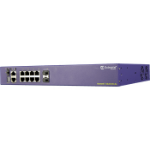
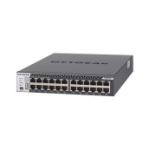
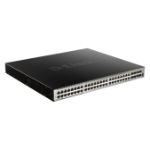
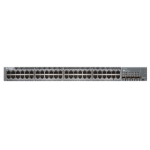
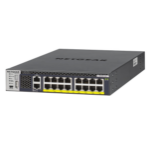
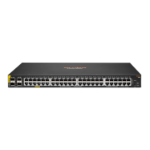
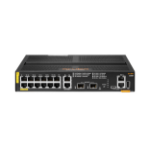
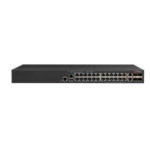
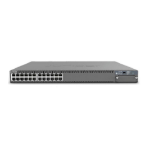
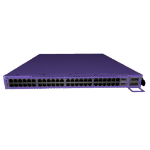
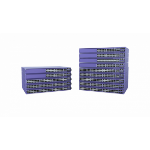
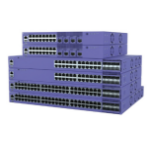
Log In